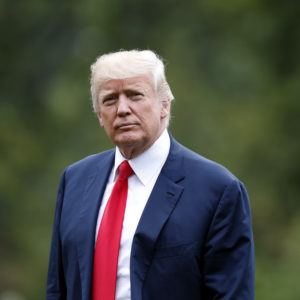President Donald Trump faces his moment of truth in midterm congressional elections in November.
That’s when we’ll know whether his rhetoric, his hyperbolic utterances, his attacks on Democrats for just about everything, his defense of dictators, his policies on taxes, health care, alliances and treaties, really are working.
Strategists for the Democratic Party see the elections for 35 of 100 senators, each of whom serve six-year terms, and for two-year terms for all 435 members of the House of Representatives, as a chance to take over both houses of Congress. For sure, if they succeed as they hope, there will be an outcry for his impeachment and ouster for what many see as Trump’s impetuous, reckless policies.
Republican Party strategists, however, are counting on the millions of working-class, middle-Americans who voted for Trump in the 2016 presidential election to stand by him in this crucial test of his popularity and power. Just as so many of the experts were proven wrong in their forecasts of victory for Hillary Clinton two years ago, so they may also be shocked to discover that Trump still holds the same appeal across America.
Or so the Republicans hope. Actually, however, GOP candidates are encountering widespread discontent over Trump’s policies, ranging from taxation reform that enriches the rich to his attacks on the Affordable Care Act — the legacy of his predecessor in the White House, Barack Obama.
Those issues undoubtedly count for more among typical American voters than some of the foreign policy questions that also are extremely controversial. At the top of that list would be his seeming defense of ruthless dictators, including Saudi Arabia’s crown prince, Mohammed bin Salmon, and North Korea’s leader Kim Jong-un.
Much as Trump would like to accept the Saudi explanation that the thugs who killed journalist Jamal Khashoggi were acting on their own, nobody’s buying that story.
Trump is having a hard time exonerating Salman when most people are convinced he ordered the murder inside the Saudi consulate in Istanbul. The fact that Khashoggi, a Saudi citizen but an American resident, was criticizing Saudi rule as a columnist for the Washington Post has given the case such a high profile that it may not blow away as Salman and Trump would like.
Then there’s North Korea’s ruler, Kim Jong-un. Voters have pretty well forgotten about him, for the moment, while accepting Trump’s claim to have solved the problem of “denuclearization,” or at least to be on the way to doing so. A second Trump-Kim summit, which may be held after the midterm elections, will undoubtedly put the North back in the headlines, but for now North Korea really isn’t an issue.
To avoid a Democratic takeover of both houses of Congress, Trump is campaigning with a kind of desperation. He’s appearing at rallies of the faithful across the country, appealing to the instincts of voters worried about illegal immigrants from Central America pouring across the border with Mexico, campaigning on the growth of the economy, denouncing the Democrats for anything that goes wrong.
Domestically, however, Trump also faces the problem of the extent to which a revised affordable health care plan would cover “pre-existing conditions.”
Candidates for Congress are speaking out about the need to be sure any revision of Obama’s health care act forces reluctant insurance companies to cover treatment for those who have been treated previously for whatever ails them. The insurance companies count on Trump to take their side just as he’s done by lowering taxes and calling for higher tariffs on imports from countries, notably China, that he blames for inundating American markets, inflicting harm on business and labor alike.
It’s easy to speculate that conservatives in favor of increasing military expenditures but against collecting the taxes needed to cover the bills will shock everyone by doing well November 6.
Right now, however, Trump remains well behind in popularity polls. He can be thankful that the Democrats really don’t have a compelling national leader who captures mass imagination. Those who are mentioned — the genial Joe Biden, a former vice president, and two senators, Bernie Sanders of Vermont and women’s favorite Elizabeth Warren of Massachusetts — just don’t measure up in the minds of many calling for “Dump Trump.”
Interestingly, Trump may even have gained popularity by headline-grabbing extended hearings for Senate approval of Brett Kavanaugh as a Supreme Court justice after several women claimed he committed sexual misbehavior against them while in their teens. Since Kavanaugh was approved and sworn in as a justice, that tale has receded.
The murder of Jamal Khashoggi, though, may be a lot more difficult to forget, and it may have repercussions on U.S. foreign policy. The United States counts on Saudi Arabia as an ally against Iran, a regional threat with close ties to North Korea, from which it imports missiles and other armaments. Then there’s the rising threat of China, North Korea’s only real ally, the source of oil and other vital supplies that get into the North despite sanctions, and the failure to get Kim Jong-un to begin getting rid of his nukes.
If both houses of the Congress are not on his side, Trump may limp through the second half of his four-year term as a lame duck fending off impeachment and unlikely to be re-elected in 2020. But one lesson of 2016 is that he may do better than many of the pundits imagine.

